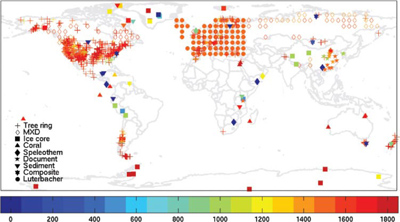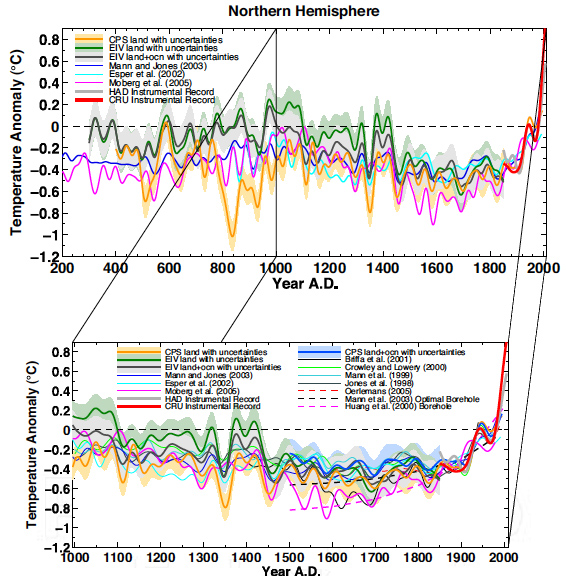Past decade is warmest in at least 1,300 years
Past decade is warmest in at least 1,300 years
Rhett A. Butler, mongabay.com
September 1, 2008
|
|
A reconstruction of surface temperatures over the past two thousand years provides further evidence that the northern hemisphere is now warmer than at any time in at least 1300 years. The research is published in the online edition of the Proceedings of the National Academy of Sciences.
Analyzing proxy data including marine and lake sediment cores, ice cores, coral cores and tree rings, Michael Mann and colleagues show that the past 10 years have been unusually warm compared with the previous two millennia.
“Our results extend previous conclusions that recent Northern Hemisphere surface temperature increases are likely anomalous in a long-term context,” the authors write. “Recent warmth appears anomalous for at least the past 1,300 years whether or not tree-ring data are used. If tree-ring data are used, the conclusion can be extended to at least the past 1,700 years.”

Spatial distribution of proxy database (see SI Text for distribution of screened network and other details). Nine different proxy types are denoted with different symbols as shown in the map. Beginning dates of proxy records are represented by color scale. Image courtesy of National Academy of Sciences, PNAS (© 2008). |
The tree of tree-ring data to construct temperature records has been controversial due to differences in the thickness of growth rings between young and old trees. The researchers say the large number of other proxies now allow them to derive a long-term temperature record for the Northern Hemisphere without tree-ring data, although data for the Southern Hemisphere is still sparse to date.
“Ten years ago, we could not simply eliminate all the tree-ring data from our network because we did not have enough other proxy climate records to piece together a reliable global record,” said Michael Mann, associate professor of meteorology and geosciences and director of Penn State’s Earth System Science Center. “With the considerably expanded networks of data now available, we can indeed obtain a reliable long-term record without using tree rings.”
The results confirm that temperatures today in the Northern Hemisphere are higher than those of the Medieval warm period, a time when the Vikings colonized Greenland are are believed to have become the first Europeans to visit North America.
Mann et al. (2008). Proxy-based reconstructions of hemispheric and global surface temperature variations over the past two millennia. PNAS September 9, 2008 vol. 105 no. 36.

Composite “composite plus scale” (CPS) methodology and “error-in-variables” (EIV) regression method (“total least squares”) North Hemisphere (NH) land and land plus ocean temperature reconstructions and estimated 95% confidence intervals. Shown for comparison are published NH reconstructions, centered to have the same mean as the overlapping segment of the CRU instrumental NH land surface temperature record 1850–2006 that, with the exception of the borehole-based reconstructions, have been scaled to have the same decadal variance as the University of East Anglia (Norwich, UK) Climatic Research Unit instrumental surface-air temperature data (CRU) series during the overlap interval. Image courtesy of National Academy of Sciences, PNAS (© 2008). |
Related article
War of words over new climate change report, ‘hockey stick’ model
Leading scientist says House climate report is “politicized”July 16, 2006
Paleoclimatologist Michael Mann criticized a report challenging the familiar “hockey stick” temperature record of the past thousand years. The report, commissioned by Texas Representative Joe Barton, chairman of the House Energy Committee, and championed in an op-ed piece appearing in last Friday’s issue of The Wall Street Journal said that there is no evidence that the 1990s were the warmest decade in a millennium or that 1998 was the warmest year in the last 1,000.